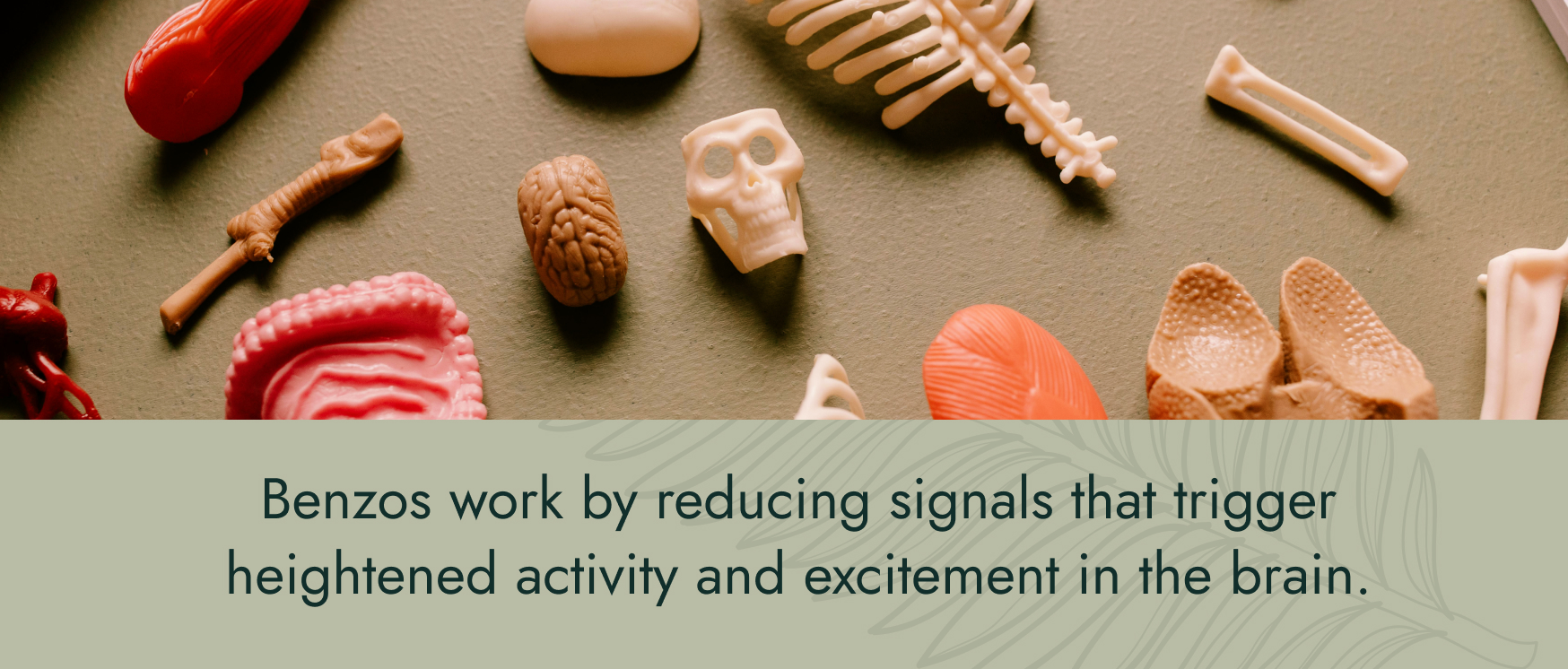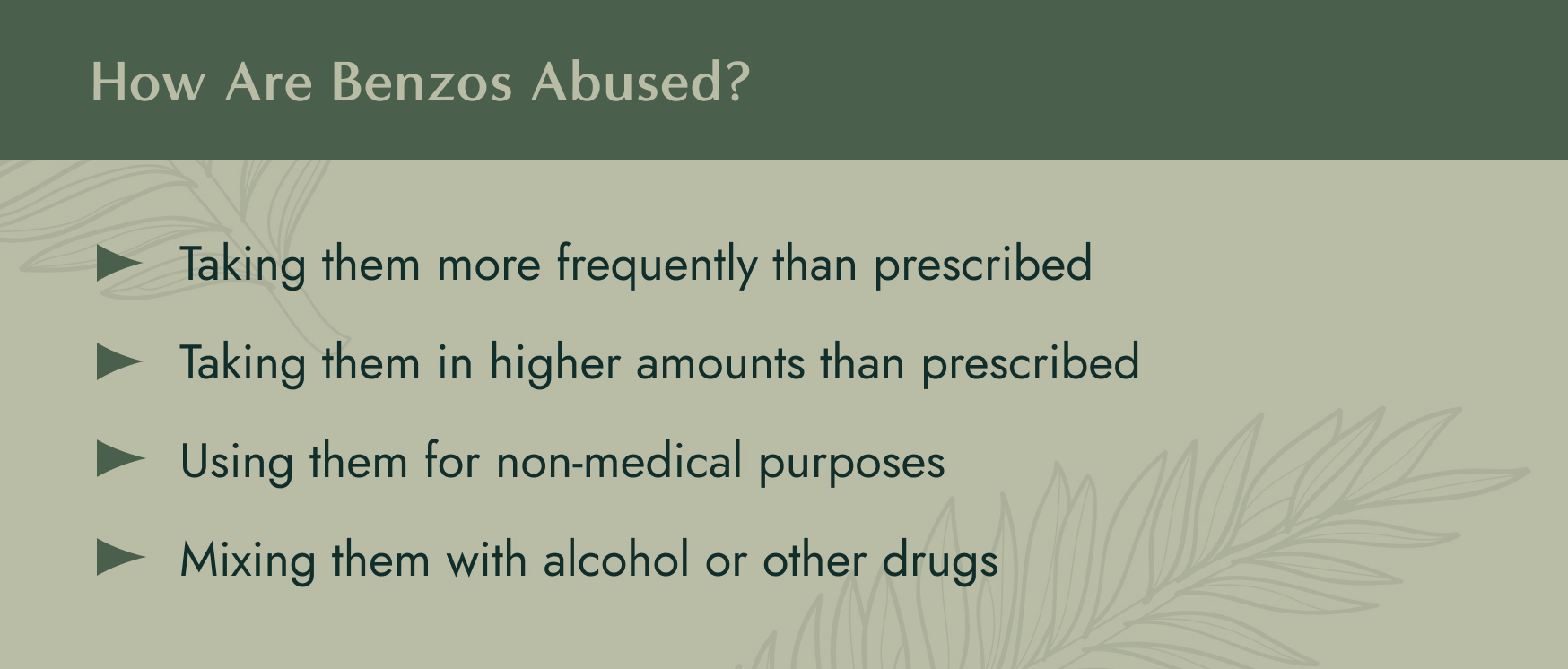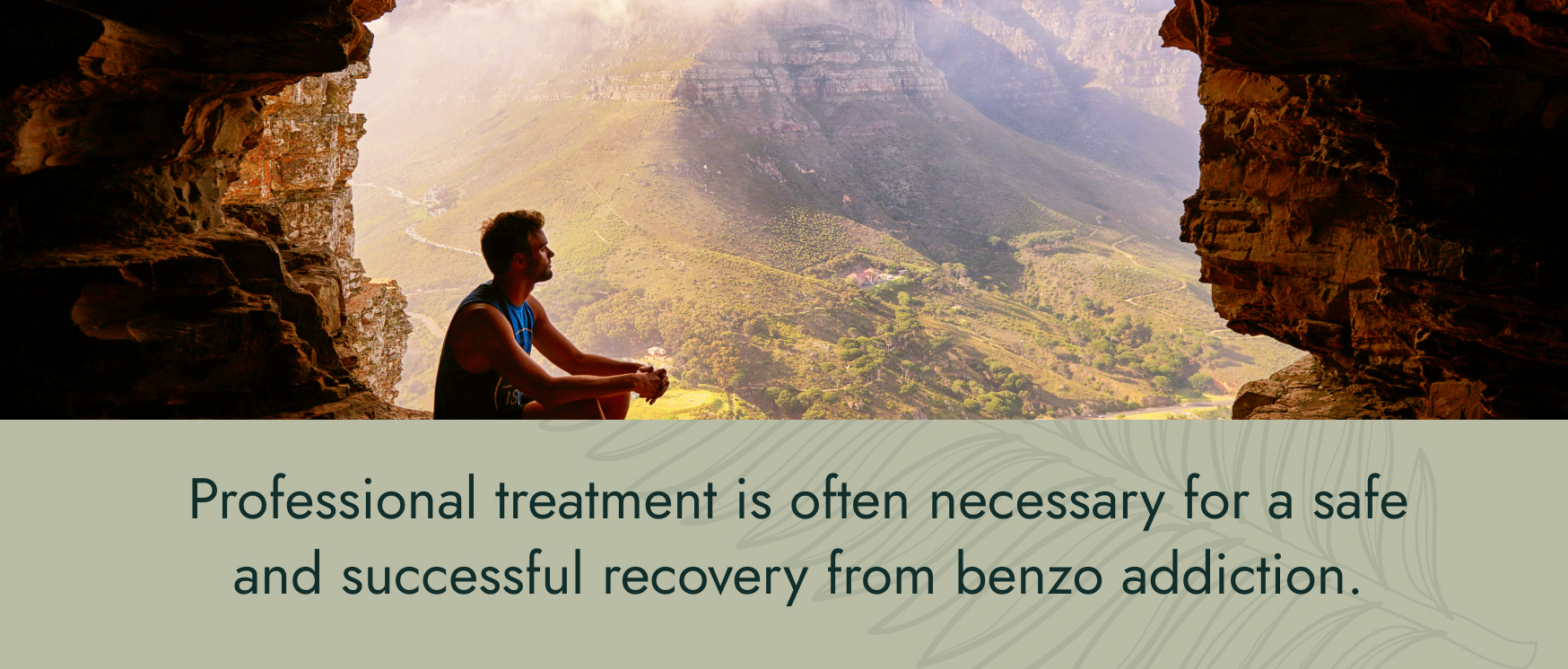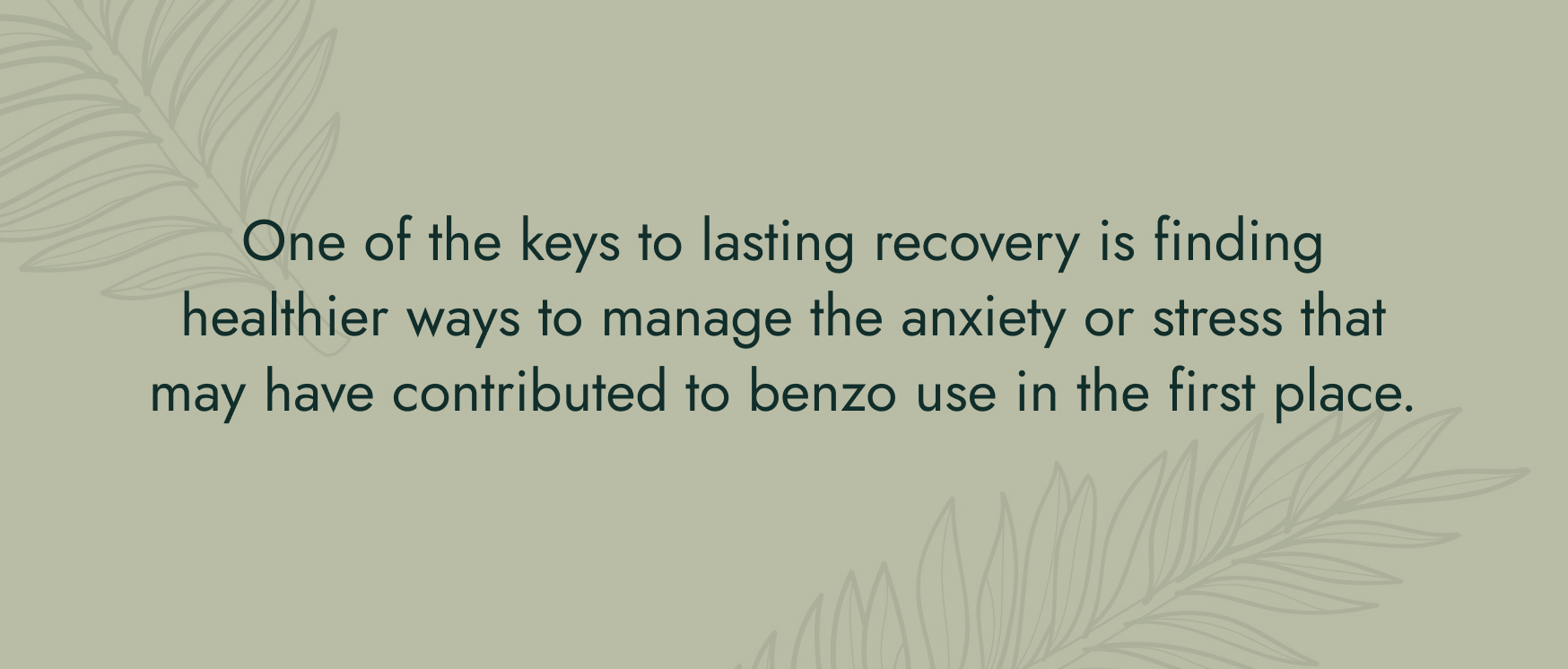Benzodiazepine Addiction Guide


Benzodiazepines, commonly referred to as “benzos”, are perhaps the most popular prescription treatment for anxiety and insomnia. According to the DEA, doctors across the US write 45 million prescriptions for alprazolam—widely known by the brand name Xanax—every year.
While there are many types of benzos, they are all defined as psychotropic medications, meaning that they affect a person’s mood. Though they have many proven uses and can be very effective for some people, most psychotropic medications come with adverse side effects.
Benzos can be physically and psychologically addictive. Learning more about them and their possible effects can protect you and your loved ones from misuse of benzos.
What Do Benzodiazepines Treat?
Benzodiazepines (benzos) are a type of central nervous system depressant commonly prescribed to slow brain activity and promote a sense of calm. They are most often used to treat generalized anxiety disorder (GAD) and panic disorder, due to their fast-acting, tranquilizing effects.
In addition to anxiety-related conditions, benzos are also prescribed for:
- Insomnia
- Alcohol withdrawal
- Epileptic seizures
- Muscle relaxation
- Sedation before medical procedures
While benzodiazepines can be highly effective in these cases, they are typically prescribed for short-term use only, especially when treating anxiety or insomnia. Most physicians recommend a course lasting no longer than one to two weeks.
Using benzos for longer than a few months significantly increases the risk of developing dependence or addiction.
Get help for prescription drug addiction in Mesa, Arizona
It's possible to manage anxiety and get treatment for addiction to anxiety medications. Learn how we treat dual diagnoses at Sequoia

How Do Benzodiazepines Work?
Benzos are known for their sedative effects. This is why they are so effective against anxiety and insomnia. They work by slowing down communication between certain nerve cells, which reduces signals that trigger heightened activity and excitement in the brain
If a neurotransmitter isn’t passed along to the next nerve cell, that message is stopped, and your body can’t complete that action. This is essentially what gamma-aminobutyric acid (GABA) does. It tells the nerve, “We don’t need that, delete that message.”

Increasing GABA
Benzos increase the activity of GABA in the brain. When more GABA is floating around, more neurotransmitters—such as anxiety-linked norepinephrine—are inhibited.
Benzos do not create GABA; they simply work by increasing GABA production and enhancing GABA activity. When GABA is not functioning optimally in the body, it can lead to mental health disorders such as anxiety, schizophrenia, and depression.
Effects of Benzodiazepines
How does this affect the rest of the body? First and foremost, benzos are known for their sedative, tranquilizing effects. Even the types that treat anxiety often cause people to feel sleepy or fatigued.
Of course, they do reduce feelings of stress and anxiety and make users feel much calmer. However, this can also come with side effects like slurred speech and weakened motor function.
Depending on the type, dose, and need for the drug, these effects might seem dreamy. However, taken improperly, benzos can lead to:
- Slowed breathing
- Amnesia
- Double vision
- Irregular heartbeat
Typically, doctors prescribe benzos for short-term use. Adverse side effects can impact everyone differently, but are more likely when the substance is taken outside of prescribed guidelines.
Types of Benzodiazepines
All benzos increase GABA activity and are not meant for long-term use. Like many prescription drugs, however, multiple types can be prescribed, and each functions differently.
There are three main types of benzodiazepines:
- Fast-Acting Benzos: They start to take effect in as little as 30 minutes, and can last anywhere from three to eight hours
- Intermediate-Acting Benzos: Generally, they’re taken once or twice a day
- Long-Acting Benzos: This type lasts anywhere from one to three days
While they may differ in how long they last, all benzodiazepines share the potential for dependence, especially with extended or improper use.
What Does Benzo Abuse Look Like?
The DEA classifies benzos as a Schedule IV drug, meaning there’s a low risk for dependence and abuse. True, it has lower risk for physical dependence than, say, opioids, but that risk is not zero.
Even with a lower classification, careful monitoring and proper use remain essential when taking benzodiazepines. Users can misuse and abuse benzos by taking them more frequently or in higher amounts than prescribed, using them for non-medical purposes, or by mixing them with other drugs.

Symptoms of Benzodiazepine Abuse
The symptoms of benzo abuse closely resemble the normal effects of the drug, though they may be amplified. Slurred speech, loss of memory, and more intense fatigue may indicate increased use.
Because benzodiazepines offer rapid relief from anxiety, panic, and insomnia, they can quickly reinforce patterns of dependence and addiction. This is especially true if someone already has a history of misusing drugs.
Effects of Benzodiazepine Addiction
Benzodiazepine addiction can take a serious toll on someone’s physical health, mental well-being, and daily functioning. Some of the most common effects of benzo addiction include:
- Dizziness or lightheadedness
- Memory problems or mental “fogginess”
- Emotional numbness or detachment from surroundings
- Increased risk of accidents due to slowed reflexes
- Withdrawing from friends, family, or obligations
- Neglecting work, school, or self-care
In addition to these effects, benzodiazepine addiction also significantly raises the risk of overdose. Signs of benzodiazepine overdose can include shallow breathing, loss of consciousness, and even death.
Withdrawal Symptoms of Benzodiazepine Addiction
Benzo withdrawal includes many of the ‘standard’ symptoms of drug withdrawal, such as nausea, sweating, and headaches. Because of the psychotropic nature of benzos, other symptoms could include:
- Seizures
- Hallucinations
- Anxiety
- Depression
- Trouble sleeping and nightmares
Doctors typically prescribe benzos for a few weeks at a time because the longer you take them, the more likely you are to become dependent on them. Coming off of them requires time and occasionally medical supervision.
Dangers of Combining Benzodiazepines With Other Drugs
Most benzo abuse involves other substances. Despite the danger of mixing drugs, many people combine benzos with other substances to increase the euphoric feelings they experience. Some substances are more dangerous than others to combine with benzos.
Opioids
Opioids on their own can be quite dangerous. Though they work through different mechanisms in the brain, opioids also produce a feeling of calm and restfulness. They also depress important functions like breathing.
According to the National Institute on Drug Abuse, those who combine opioids and benzos are more likely to end up in the emergency room or die of an overdose than they are from taking either drug type on their own.
Alcohol
Alcohol is also a depressant. In large quantities, it also reduces breathing and cognitive functions. It’s true that benzos can be used to help with the dangerous symptoms of alcohol withdrawal. However, a doctor will only prescribe them when alcohol is no longer in the person’s system.
Like opioids, combining these depressants can have dangerous results. Not only is the likelihood of taking a dangerous dose of benzos higher, but alcohol abuse also increases the likelihood that a person will take benzos at all. The University of California San Francisco found that ‘problem drinkers’ were 15% more likely to use benzos than moderate and non-drinkers.
That same study showed that alcohol was involved in 1 in 5 benzodiazepine-related deaths.
Read our related article for more risks of combining xanax and alcohol.
Benzodiazepine Addiction Treatment
Recovering from benzodiazepine addiction requires a specialized approach that prioritizes both physical safety and long-term emotional support.
Because of the way benzos affect brain chemistry, quitting “cold turkey” can be dangerous and, in some cases, life-threatening. That’s why professional treatment is often necessary for a safe and successful recovery.

Inpatient Treatment
For many people, inpatient or residential treatment is the most effective first step in overcoming benzodiazepine addiction. These programs provide 24/7 medical care, emotional support, and a structured environment that’s free from outside triggers.
Benefits of inpatient care include:
- Supervised detox to manage withdrawal symptoms
- Access to licensed medical and mental health professionals
- Individual and group therapy
- A supportive community of peers
- No access to substances during the most vulnerable phase of recovery
This level of care is especially important if benzos have been used for a long time or in combination with other substances, such as alcohol or opioids.
Medication Management
Because benzodiazepines affect the central nervous system, a slow and medically supervised taper is usually required. Suddenly stopping benzos can cause severe withdrawal symptoms, including seizures, panic attacks, and insomnia.
Tapering is not one-size-fits-all. It must be tailored to the individual’s history, dosage, and overall health. A personalized tapering plan helps reduce withdrawal symptoms and ensures the process is as safe and comfortable as possible.
Sequoia Behavioral Health provides pharmacogenetic testing to take the guesswork out of medication management and help you get started on your healing journey as soon as possible.
Learning New Ways to Manage Anxiety
One of the keys to lasting recovery is finding healthier ways to manage the anxiety or stress that may have contributed to benzo use in the first place. This can involve a combination of therapeutic strategies, such as:
- Cognitive Behavioral Therapy (CBT): Helps identify and reframe anxious thought patterns
- Mindfulness and meditation: Builds self-awareness and reduces physical symptoms of anxiety
- Exercise and physical activity: Naturally boosts mood-regulating chemicals in the brain
- Stress management techniques: Such as deep breathing, journaling, or progressive muscle relaxation
- Non-addictive medications: In some cases, providers may recommend alternatives like SSRIs for long-term anxiety management
These healthier alternatives not only address the underlying reasons for benzo use, but they can also help someone prevent relapse and build a more stable, fulfilling life.

Read our related guide for more information on anxiety and how it’s treated.
Related Blogs

Meditations for Anxiety—4 Meditation Techniques for Relieving Stress and Anxiety
Meditation is a powerful tool for managing anxiety. Discover four effective meditation techniques that can help you the next time you’re feeling anxious.

What to Know About Setting Goals for Treatment
Treatment goals reflect what you want out of therapy. Discover goals to work on in therapy, why treatment goals are important, and how to set them.

A Guide to Psychological Dependence
Psychological dependence makes it hard to feel like yourself without substances. Discover what it is, what the signs are, and how it can be treated.
Take the First Step Toward Recovery
Though it is treatable, addiction is still a disease. Whether you find yourself at risk of developing a benzodiazepine dependence or you currently struggle with addiction, there are options, and there is hope.
Sequoia Behavioral Health will guide you through your sobriety journey. With our holistic approach to therapy and customizable levels of care, we can help you get to the root of your substance use disorder and achieve a lasting recovery.
Reach out today to connect with a mental health professional and take the first step towards a lasting recovery.
Learn More
Cognitive Behavioral Therapy
Cognitive Behavioral Therapy (CBT) helps clients connect their thoughts and emotions in order to better control their reactions and behaviors.
Medication Management
We find the proper medication for our clients through pharmacogenetic testing in order to increase treatment success after a client leaves our facility.
Psychiatric Care
Medications and therapy are more effective when used together. Sequoia's psychiatry team will make mental health diagnoses and prescribe medications.
Whether you experience inpatient, intensive outpatient, or partial hospitalization programming here at Sequoia, you'll get to experience holistic and integrative treatment. Learn more about our different levels of care.


